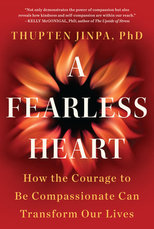 The Dalai Lama’s interpreter shares his thoughts on ending the madness. In my work as a journalist for Life Reimagined, I get the privilege to meet, talk and correspond with some of the most interesting people alive. Thupten Jinpa has been the Dalai Lama’s English translator for 30 years. A Buddhist monk, he gave up his practice to pursue a Ph.D in religious studies at Cambridge. Jinpa granted me an interview about his new book A Fearless Heart: How the Courage to be Compassionate can Transform our Lives. We looked at the role of compassion in modern life, and you can read that interview here. I also asked him to comment on something that’s been troubling me for a long time. With violence escalating across the globe and even here at home, how do we keep our hearts from hardening? Is there a way out of this inhumanity? Here is his thought-provoking response. Q: You make the case that the time has come for compassion, and Paul Ekman says "global compassion" is the most important challenge of our time. Yet the news is filled with reports of anti-compassion: beheadings in the Middle East; terrorist attacks in France; unjustified police shootings in the US. How can we possibly bring compassion to the people committing these atrocities? "Love the sinner but hate the sin," won't cut it in these situations -- the acts of inhumanity are too extreme. What are your thoughts? A: Although the crises of violence we are sadly witnessing today in different parts of the world - e.g. the three examples cited - are very different from each with different roots, one thing that is common to all is a deep sense of alienation some people are experiencing in their lives. I view the rise of Islamic extremism especially in the Middle East, with overt embracing of violence, to be primarily a consequence of the wider society's failure in that part of the world to find a constructive way of making peace with modernity. In France too, it's well-known that the problem of not integrating well the immigrant community and also the way in which the entire rhetoric of "secular culture" has been conducted have led to further alienation of a large segment of the immigrant community, especially the younger generation. Needless to say, this problem has been further complicated by the economic downtown, which generally tend to affect people at the lower rung first. The situation with police shootings in the US is quite different. It has more to do with the particular kind of policing culture as well as the still persistent racial issues. Anyway, nothing can justify the horrific acts being committed in the name of Islam today; still, the most effective way to address the problem in the long run is to try to ground our collective response to the problem in some deeper understanding of the other's situation, and the sources of their anger and frustration. A compassionate response does call for such understanding, but no way does it entail condoning the violent acts being done. Nor does it preclude, as a dogmatic standpoint, the need sometimes to use strong measures, including limited force when absolutely necessary. One important advantage of grounding one's response, including even a forceful one, on compassion is that our response will not be driven by fear and anger, which generally only lead to further misunderstanding and complication. No one really comes out as a winner when as a society, we react to events with fear, animosity, and grudge. What are your thoughts? Can we summon the humanity needed to address these issues at their core? You can pre-order A Fearless Heart here.
0 Comments
|
AuthorI've never been accused of not having an opinion. Even if you don't agree, hopefully you will enjoy! Archives
April 2020
Categories |

 RSS Feed
RSS Feed